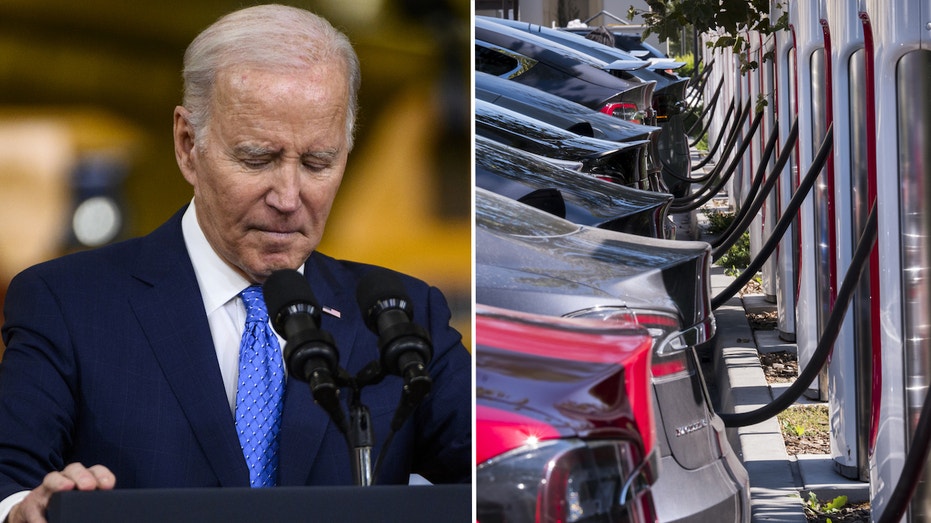The Biden administration is weighing an aggressive proposal to implement the tightest-ever federal regulations governing tailpipe emissions in an effort to boost electric vehicles.
The Environmental Protection Agency (EPA) is expected to announce the new standards, which will impact cars manufactured between 2027-2032, next week during a ceremony in Detroit, Bloomberg reported on Thursday, citing officials briefed on the proposal. In a statement, the EPA confirmed the standards are designed to incentivize consumers to purchase electric vehicles (EV).
“Already, President Biden’s Investing in America agenda is powering a domestic clean energy manufacturing boom, lowering costs for American families, and creating good-paying union jobs,” the EPA told Fox News Digital.
“As directed by the President in an executive order, the EPA is developing new standards that will build on this historic progress and support the transition to a zero-emissions transportation future, lowering costs for consumers, and protecting people and the planet,” the agency’s statement continued. “Because they are currently under interagency review, EPA cannot comment further on the rules.”
JOE MANCHIN BLASTS BIDEN ADMIN FOR CEDING CONTROL TO CCP ON GREEN ENERGY: ‘PATHETIC’
In August 2021, President Biden signed an executive order, requiring the EPA to introduce fuel efficiency and emissions standards to “tackle the climate crisis.” Months later, in a move reversing a Trump administration rule, the EPA finalized greenhouse gas emissions standards for vehicles made between 2023 and 2026, regulations the agency billed at the time as the “most ambitious” rules of their kind.
The proposal expected next week is set to be introduced as the Biden administration continues its aggressive push for more Americans to switch to EVs and to electrify home appliances in an effort to combat global warming. Biden set a goal shortly after taking office for half of all cars sold in the U.S. to be zero emissions by 2030 and has repeatedly visited EV manufacturing facilities.
“The future of the auto industry is electric,” Biden remarked during a visit to a Ford EV center in Michigan early in his presidency. “There’s no turning back.”
BIDEN NOMINEE COORDINATED DARK MONEY CLIMATE NUISANCE LAWSUITS INVOLVING LEONARDO DICAPRIO
Despite the massive push from Biden and Democratic-led states for Americans to more quickly adopt EVs, traditional gas-powered cars represented 93% of all new car sales in 2022, according to a recent report from the Alliance for Automotive Innovation. And EVs remain far more expensive and less efficient than alternatives.
Overall, the average cost of an EV was $64,338 while the average cost of a compact gas-powered car was $26,101 as of last year, according to Kelley Blue Book. In addition, the Department of Energy reported that the average range of model year 2021 gasoline vehicles was 403 miles compared to the median 234-mile range of model year 2021 EVs.
Last year, meanwhile, the National Highway Traffic Safety Administration (NHTSA) unveiled new fuel economy standards that it said would boost fuel efficiency, but acknowledged it would cost automakers about $236.5 billion and eventually make cars $1,000 more expensive. The standards are projected to increase fuel efficiency 8% annually for model years 2024-2025 and 10% annually for model year 2026.
BIDEN NOMINEE WANTS TO HIJACK LITTLE-KNOWN AGENCY TO RAM THROUGH CLIMATE AGENDA
Transportation Secretary Pete Buttigieg said at the time that the regulations would “protect communities by reducing carbon emissions.” However, critics blasted the rule for increasing consumer costs amid high inflation.
“NHTSA’s new fuel economy standards will only add to the cost of new cars, depriving people of safe, affordable vehicles, at a time when they are already struggling,” said Rep. Cathy McMorris Rodgers, R-Wash., the current chair of the Energy and Commerce Committee.
“It also enforces burdensome penalties on manufacturers—who are finding it difficult to keep up with high demand and inventory shortages as it is—which will only increase prices further as these ’penalties’ are passed along to the consumers.”
In addition, the EPA’s ambitious standards are set to come shortly after the Biden administration proposed a series of rules on how it would implement EV tax credit provisions of the Inflation Reduction Act. Under the provisions, consumers will only be able to receive tax credits for EVs that are manufactured with a certain amount of critical minerals and components from the U.S. or nations the U.S. is in a free trade agreement with.
However, because the U.S. supply chain currently sources an outsized share of its critical minerals and EV battery components from China and other foreign nations, the rules will greatly restrict which EVs will ultimately be eligible for the tax credits. China currently boasts 78% of the world’s cell manufacturing capacity for EV batteries, according to a Brookings Institution analysis released in July.
A Biden administration official told reporters during a call on March 31 that they were unsure how many vehicles would actually be eligible for tax credits under its proposed rules.
























